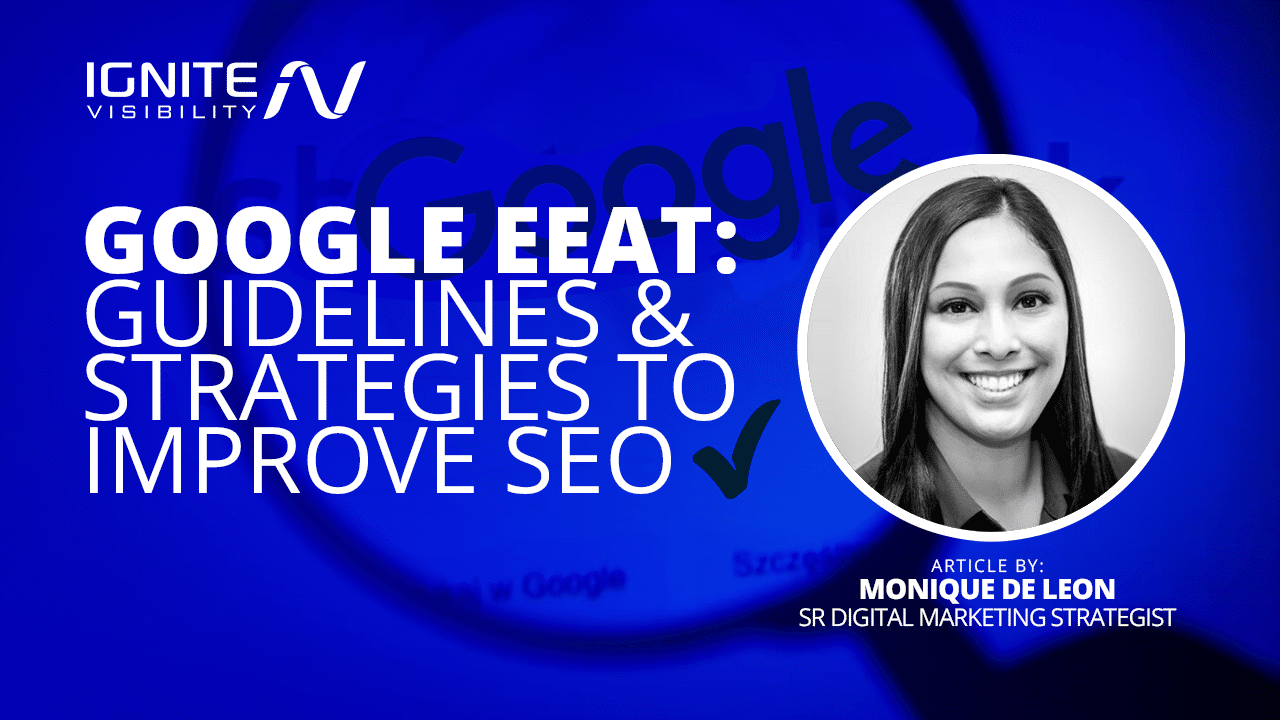
Google EEAT – Monique De Leon
Ever wondered if your online presence is shaped by what you EEAT in SEO? Well, when it comes to Google and its ranking factors, that just might be the case.
Let’s define what is EEAT, unravel its significance and discover how to craft content that’s SEO-proof with a touch of EEAT magic. Ready to elevate your online game? Let’s dive in!
What You’ll Learn:
- Google’s Quality Rater Guidelines
- E – Expereince
- E – Expertise
- A – Authrotiy
- T – Trustworthiness
Our Expert Insights on Google EEAT
According to our Senior Digital Strategist, Monique DeLeon, “EEAT is the backbone of SEO, defining how trustworthy and impactful content can be. As of December 2022, Google upgraded its model, to include another “E,” assessing experience, expertise, authority, and trustworthiness.
This holistic approach ensures that not only the information presented is accurate but also that it comes from credible and knowledgeable sources.
Action Item: Foster connections within your industry, engage with your audience and uphold a commitment to honesty and reliability. By embodying these principles, you not only align with the EEAT model but also position yourself as a go-to source for reliable information, bolstering your SEO efforts.
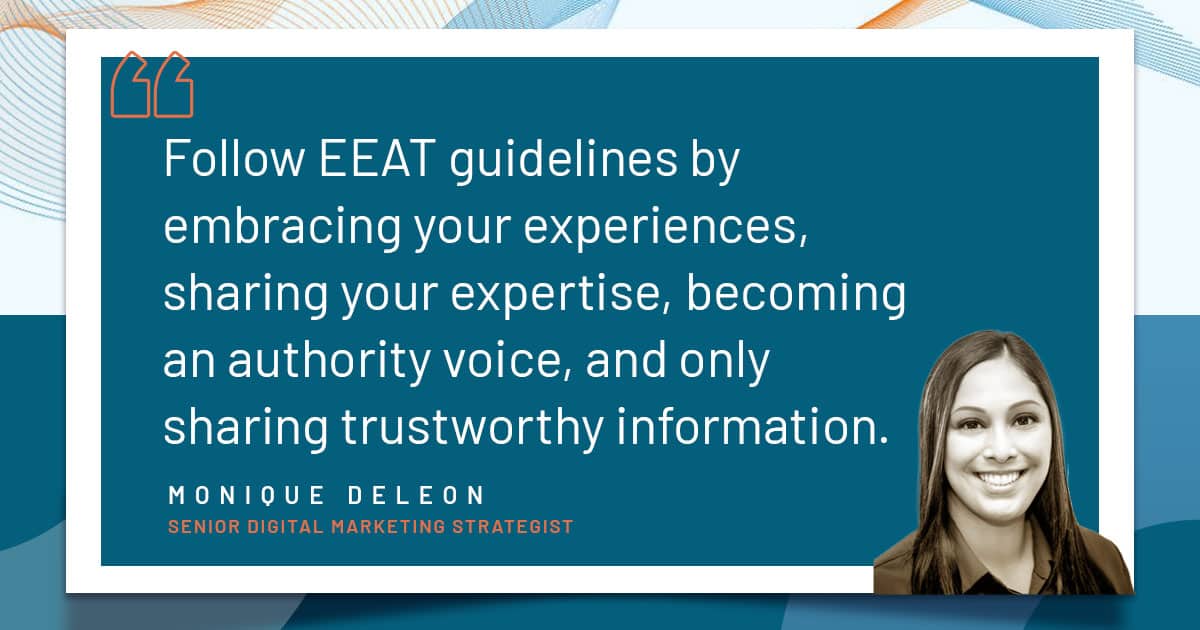
Monique Deleon – EEAT
Google’s Quality Rater Guidelines
Delving into Google’s expansive 167-page Quality Guidelines might seem like a daunting task, initially crafted for Search Quality Raters. “Raters help us categorize information to improve our systems. For example, we might ask what language a page is written in or what’s important on a page,” states Google.
However, this treasure trove isn’t exclusive to them—SEOs and webmasters can leverage it to elevate their websites, align with quality standards, and enhance search visibility.
At the core of this intricate web lies a global network of 14,000 Search Quality Raters, each representing their unique locale and cultural nuances. While diversity is celebrated, the guidelines provide a universal yardstick for assessing web pages, emphasizing user intent and need to be met.
Crucially, the key factors determining a page’s quality are as straightforward as they are significant—experience, expertise, authoritativeness, and trustworthiness (EEAT). Google underscores that, amidst these factors, trust is the linchpin. A page’s rank isn’t just about expertise; it hinges on delivering trustworthy and authoritative content.
However, be mindful of the subjective nature of these signals. An expert in one domain may lack trust in another. For instance, a food blogger might excel in authority on gastronomy but not in medical topics. Google acknowledges these nuances, emphasizing that different content demands varying levels of EEAT.
In essence, trust emerges as the ultimate signal, permeating diverse content landscapes—be it an online store, medical website, or a humble recipe blog. So, in the vast expanse of Google’s guidelines, the beacon remains clear—infuse your content with authenticity, expertise, and trust to ascend the ranks of the digital realm.
Let’s take a closer look at EEAT and explore how SEO can weave its influence while staying true to these guiding principles.
E: Experience
Picture “experience” as the essence of lived moments—those first-hand encounters with the very topics you’re passionate about. In today’s era of generative AI content, where algorithms attempt to emulate human experiences, real-life encounters stand out. AI, while impressive, can only simulate assumptions about the human journey; its creations lack the authentic touch.
Notably, Google’s nod to “experience” in its search quality guidelines closely followed ChatGPT’s launch. The reason is clear—experience distinguishes content crafted by humans from that generated by AI.
To showcase your unique perspective, bring faces to your website. Aligning with Stanford’s web credibility guidelines, reveal the human touch behind your digital presence. Let your audience know there’s a genuine organization steering your site, boasting expertise in both content and services. The message is simple—honest and trustworthy individuals champion your online space.
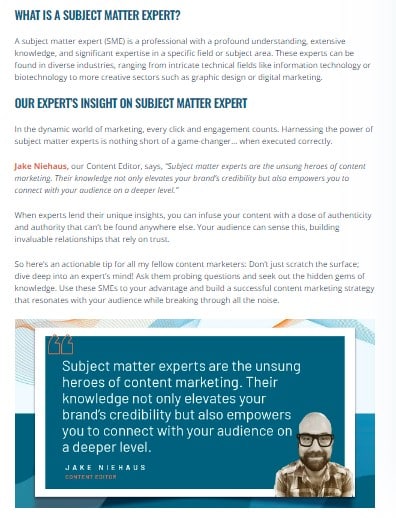
E: Expertise
Becoming a recognized authority in your field is your first step to online success. And by creating compelling content, you’re already on the right track. It’s important to transform into a subject matter expert effortlessly, by showcasing your knowledge through impactful posts.
Imagine readers scrolling through your blog, thinking, “This author really knows their stuff!” Crafting a homepage that shouts about who you are, your experience, and what you do amplifies your expert persona. So don’t be afraid to brag here.
And don’t underestimate the power of your photo and biography—they’re your trust-building allies. A picture next to your content adds authenticity, while a well-crafted bio weaves your life experiences and education, cementing you as the go-to expert.
And here’s the cherry on top—whether you’re a formal or everyday expert, you don’t just publish content; you create a trustworthy online presence.
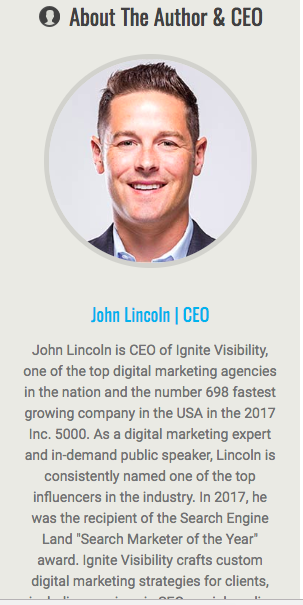
Expertise – Author Bio and Photo
A: Authority
In the vast digital landscape, being an expert is just the first step; true influence comes from establishing authority. It’s not just about what you know, but how you’re perceived by others. The distinction lies in the ability to translate expertise into impact. Social proof is your ally—feature testimonials on your homepage, giving a human touch with photos and links.

Example of Testimonials – Building Authority Through Social Proof
Narrate your journey through speaking engagements at industry conferences, progressively positioning yourself as a keynote speaker. The coveted stamp of authority often comes from endorsements by key influencers, shaping a narrative beyond individual expertise.

Example of Authority – Speaking Engagements
T-Trustworthiness
Trust is the bedrock of any credible website, and building it requires a multi-faceted approach. Accuracy is paramount—eliminate factual errors from your content, ensuring that your information is reliable.
Embrace transparency by allowing others to scrutinize and review your work; confidence in your statements is a testament to your trustworthiness. Source your information diligently, providing a trail that validates your claims. Case studies with real names add authenticity and credibility, fostering trust among your audience. Secure your digital space with HTTPS and prominently feature a Privacy Policy, reinforcing trust through visible safeguards.
Expanding on EEAT
It’s safe to say Google EEAT framework encompasses various dimensions. Prioritize helpfulness by infusing value into your content—think beyond keywords and focus on providing genuine assistance. Accuracy is non-negotiable; stick to well-known facts to uphold the integrity of your information.
You also want to be sure to prioritize quality over quantity in your content creation, ensuring that every piece is insightful and original. Addressing readers’ needs is central—present information clearly and effectively to meet their expectations.
Ultimately, EEAT is about placing your audience at the forefront, crafting content that serves as a solution rather than mere words.
In the dynamic realm of online presence, the convergence of authority, trustworthiness, and EEAT creates a robust foundation for success.
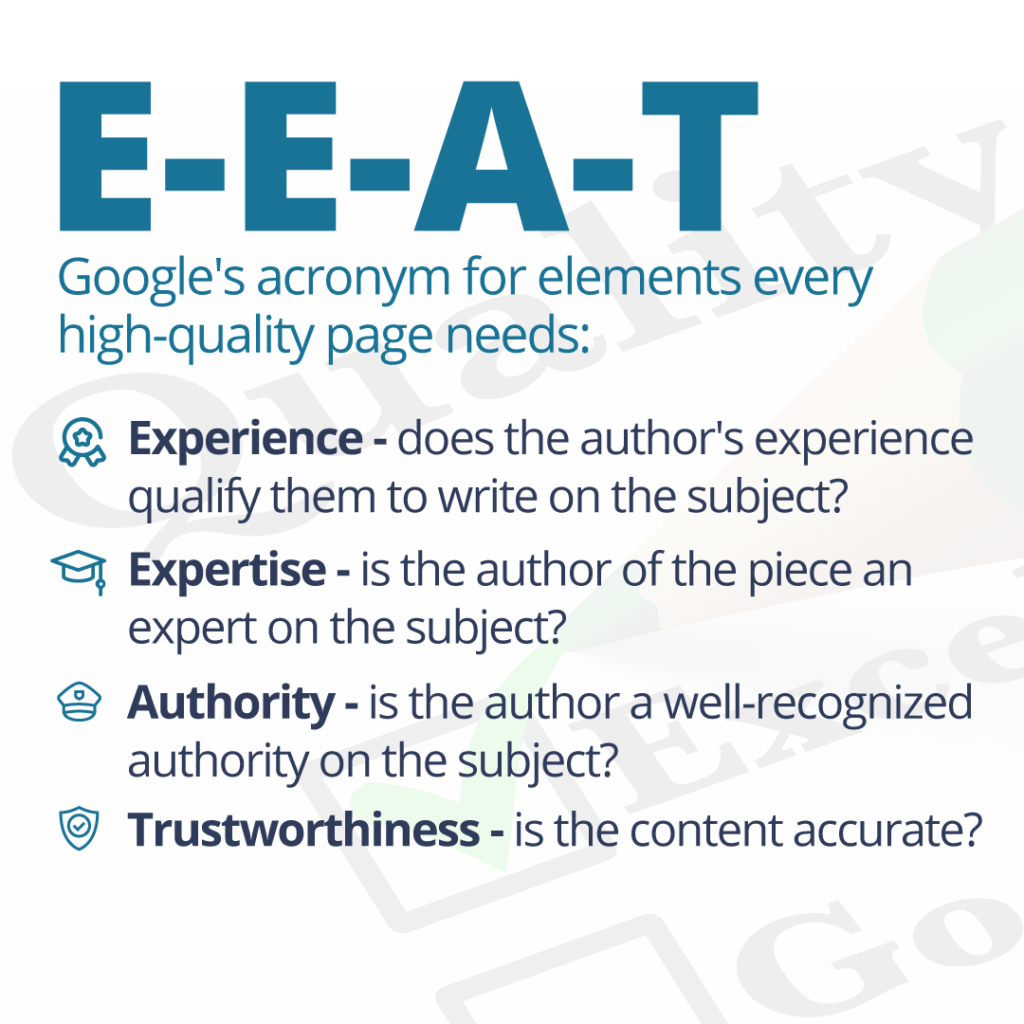
E-E-A-T
How to Improve Your EEAT
As you navigate the complexities of content creation, ensuring your website exudes trust and authority is paramount. Here’s a comprehensive guide to fortify your online presence:
- Update Information: Regularly refresh content, especially if it’s time-sensitive.
- Quality Site Design: A well-designed, bug-free site enhances credibility, especially on mobile.
- Produce In-Depth Content: Opt for long-form content to showcase expertise and improve SEO.
- Single-Subject Focus: Stick to a single, overarching theme per article to avoid confusion.
- Link to Experts: Include links to peer-reviewed articles, signaling thorough research.
- Provide Actionable Advice: Share knowledge and guide readers on applying information.
- Author Bios: Conclude with author bios and proof of expertise, fostering transparency.
- Regular Content Audits: Keep information updated and fix broken links.
- Rewrite Old Content: Refresh outdated content with new and relevant information.
- Author Information: Include comprehensive author bios and links to other works.
- Credible Sources: Always rely on trustworthy and credible sources.
- Build Brand Reputation: Cultivate trust in your brand through consistent reliability.
- User-Generated Content: Showcase audience experiences through guest blogs, social media posts, or videos.
- Backlink Building: Focus on building quality backlinks to enhance your website’s authority.
FAQs About EEAT
1. What is EEAT?
The Google EEAT (experience, expertise, authoritativeness, and trustworthiness) principle is a crucial aspect of SEO, emphasizing website quality. It ensures content is helpful, high-quality, and accurate.
2. Why is EEAT important for SEO?
EEAT is vital for SEO as it focuses on delivering content with purpose, preventing fake news and spammy links from compromising user experiences. It plays a significant role in enhancing website quality.
3. Is Google EEAT a ranking factor?
Yes, EEAT serves as a crucial factor in the ranking algorithm. It influences the evaluation of website quality by human “Quality Raters,” impacting search rankings.
4. When did Google introduce EEAT?
Initially introduced in 2014, Google updated the EAT term in December 2022, adding an additional “E” for “experience.” This acronym, now EEAT, continues to play a vital role in Google’s Search Quality Raters tests.
Work With Ignite to Meet EEAT Guidelines
Elevate your content and drive traffic with help from our SEO experts. From monitoring your online presence to automating marketing efforts and optimizing social media impact, we cover it all.
Why EEAT SEO Matters:
- Ensures helpful, high-quality, and accurate content delivery.
- Guards against future consequences of low-quality ratings.
- Prevents fake news and spammy links from compromising user experiences.
Choose Ignite Visibility for comprehensive EEAT expertise. Embark on the journey today!

